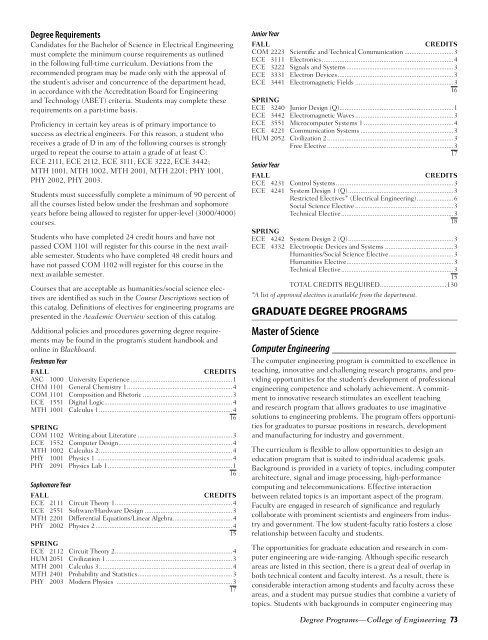2008–2009 - Florida Institute of Technology
2008–2009 - Florida Institute of Technology
2008–2009 - Florida Institute of Technology
Create successful ePaper yourself
Turn your PDF publications into a flip-book with our unique Google optimized e-Paper software.
Degree Requirements<br />
Candidates for the Bachelor <strong>of</strong> Science in Electrical Engineering<br />
must complete the minimum course requirements as outlined<br />
in the following full-time curriculum. Deviations from the<br />
recommended program may be made only with the approval <strong>of</strong><br />
the student’s adviser and concurrence <strong>of</strong> the department head,<br />
in accordance with the Accreditation Board for Engineering<br />
and <strong>Technology</strong> (ABET) criteria. Students may complete these<br />
requirements on a part-time basis.<br />
Pr<strong>of</strong>iciency in certain key areas is <strong>of</strong> primary importance to<br />
success as electrical engineers. For this reason, a student who<br />
receives a grade <strong>of</strong> D in any <strong>of</strong> the following courses is strongly<br />
urged to repeat the course to attain a grade <strong>of</strong> at least C:<br />
ECE 2111, ECE 2112, ECE 3111, ECE 3222, ECE 3442;<br />
MTH 1001, MTH 1002, MTH 2001, MTH 2201; PHY 1001,<br />
PHY 2002, PHY 2003.<br />
Students must successfully complete a minimum <strong>of</strong> 90 percent <strong>of</strong><br />
all the courses listed below under the freshman and sophomore<br />
years before being allowed to register for upper-level (3000/4000)<br />
courses.<br />
Students who have completed 24 credit hours and have not<br />
passed COM 1101 will register for this course in the next available<br />
semester. Students who have completed 48 credit hours and<br />
have not passed COM 1102 will register for this course in the<br />
next available semester.<br />
Courses that are acceptable as humanities/social science electives<br />
are identified as such in the Course Descriptions section <strong>of</strong><br />
this catalog. Definitions <strong>of</strong> electives for engineering programs are<br />
presented in the Academic Overview section <strong>of</strong> this catalog.<br />
Additional policies and procedures governing degree requirements<br />
may be found in the program’s student handbook and<br />
online in Blackboard.<br />
Freshman Year<br />
FALL CREDITS<br />
ASC 1000 University Experience ..........................................................1<br />
CHM 1101 General Chemistry 1 ............................................................4<br />
COM 1101 Composition and Rhetoric ...................................................3<br />
ECE 1551 Digital Logic.........................................................................4<br />
MTH 1001 Calculus 1 ............................................................................4<br />
16<br />
SPRING<br />
COM 1102 Writing about Literature ......................................................3<br />
ECE 1552 Computer Design .................................................................4<br />
MTH 1002 Calculus 2 ............................................................................4<br />
PHY 1001 Physics 1 .............................................................................4<br />
PHY 2091 Physics Lab 1 .......................................................................1<br />
16<br />
Sophomore Year<br />
FALL CREDITS<br />
ECE 2111 Circuit Theory 1 ...................................................................4<br />
ECE 2551 S<strong>of</strong>tware/Hardware Design ..................................................3<br />
MTH 2201 Differential Equations/Linear Algebra ..................................4<br />
PHY 2002 Physics 2 ..............................................................................4<br />
15<br />
SPRING<br />
ECE 2112 Circuit Theory 2 ...................................................................4<br />
HUM 2051 Civilization 1 ........................................................................3<br />
MTH 2001 Calculus 3 ............................................................................4<br />
MTH 2401 Probability and Statistics ......................................................3<br />
PHY 2003 Modern Physics ..................................................................3<br />
17<br />
Junior Year<br />
FALL CREDITS<br />
COM 2223 Scientific and Technical Communication ............................3<br />
ECE 3111 Electronics ...........................................................................4<br />
ECE 3222 Signals and Systems .............................................................3<br />
ECE 3331 Electron Devices ..................................................................3<br />
ECE 3441 Electromagnetic Fields ........................................................3<br />
16<br />
SPRING<br />
ECE 3240 Junior Design (Q) .................................................................1<br />
ECE 3442 Electromagnetic Waves ........................................................3<br />
ECE 3551 Microcomputer Systems 1 ...................................................4<br />
ECE 4221 Communication Systems .....................................................3<br />
HUM 2052 Civilization 2 ........................................................................3<br />
Free Elective ........................................................................3<br />
17<br />
Senior Year<br />
FALL CREDITS<br />
ECE 4231 Control Systems ...................................................................3<br />
ECE 4241 System Design 1 (Q) ............................................................3<br />
Restricted Electives* (Electrical Engineering) .....................6<br />
Social Science Elective ........................................................3<br />
Technical Elective ................................................................3<br />
18<br />
SPRING<br />
ECE 4242 System Design 2 (Q) ............................................................3<br />
ECE 4332 Electrooptic Devices and Systems .......................................3<br />
Humanities/Social Science Elective .....................................3<br />
Humanities Elective .............................................................3<br />
Technical Elective ................................................................3<br />
15<br />
TOTAL CREDITS REQUIRED ......................................130<br />
*A list <strong>of</strong> approved electives is available from the department.<br />
grADuATe Degree ProgrAmS<br />
Master <strong>of</strong> Science<br />
Computer Engineering _______________________<br />
The computer engineering program is committed to excellence in<br />
teaching, innovative and challenging research programs, and providing<br />
opportunities for the student’s development <strong>of</strong> pr<strong>of</strong>essional<br />
engineering competence and scholarly achievement. A commitment<br />
to innovative research stimulates an excellent teaching<br />
and research program that allows graduates to use imaginative<br />
solutions to engineering problems. The program <strong>of</strong>fers opportunities<br />
for graduates to pursue positions in research, development<br />
and manufacturing for industry and government.<br />
The curriculum is flexible to allow opportunities to design an<br />
education program that is suited to individual academic goals.<br />
Background is provided in a variety <strong>of</strong> topics, including computer<br />
architecture, signal and image processing, high-performance<br />
computing and telecommunications. Effective interaction<br />
between related topics is an important aspect <strong>of</strong> the program.<br />
Faculty are engaged in research <strong>of</strong> significance and regularly<br />
collaborate with prominent scientists and engineers from industry<br />
and government. The low student-faculty ratio fosters a close<br />
relationship between faculty and students.<br />
The opportunities for graduate education and research in computer<br />
engineering are wide-ranging. Although specific research<br />
areas are listed in this section, there is a great deal <strong>of</strong> overlap in<br />
both technical content and faculty interest. As a result, there is<br />
considerable interaction among students and faculty across these<br />
areas, and a student may pursue studies that combine a variety <strong>of</strong><br />
topics. Students with backgrounds in computer engineering may<br />
Degree Programs—College <strong>of</strong> Engineering 73

















